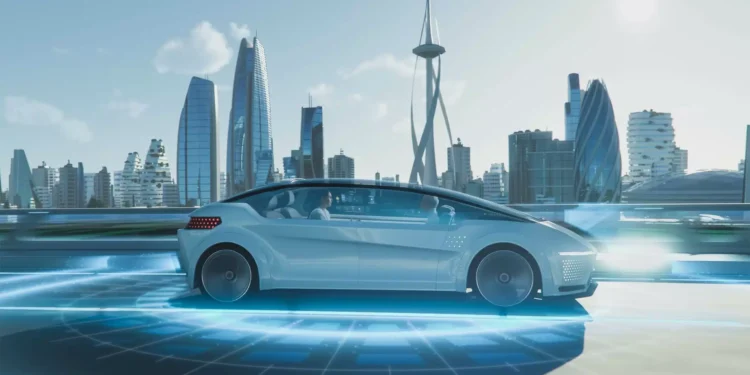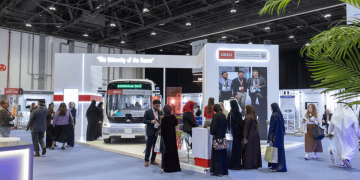The Middle East, long known for its role as a global oil powerhouse, is now investing heavily in the future of transportation. Countries that once built their wealth on fossil fuels are putting billions into electric vehicles and driverless car technology, signaling a major shift in direction.
This marks a broader rethink of how people move around in a region defined by harsh weather, wide distances, and economies tied to oil. As the world gradually moves away from fossil fuels, these nations are placing early bets on cleaner, more efficient alternatives, aiming to stay ahead of the curve and reduce their reliance on oil in the long run.
Current Mobility Landscape: Early Days with Ambitious Plans
The Middle East’s electric vehicle market is still nascent but poised for explosive growth. Currently valued at approximately $2.8 billion in 2024, projections indicate the market could reach $10.9 billion by 2032. The region’s EV adoption remains relatively low compared to global leaders, but this is changing rapidly due to concerted government efforts and strategic investments.
“The Middle East EV market is still in its early stages but could grow to $54 billion by 2035, with EVs potentially representing nearly two-thirds of overall new car sales,” according to research by Bain & Company. This represents a significant transformation in a region historically dominated by conventional vehicles.
Several significant challenges currently hinder widespread adoption, including:
- Limited charging infrastructure, particularly outside major urban centers
- High upfront costs of EVs compared to conventional vehicles
- Extreme climate conditions affecting battery performance
- A market still heavily reliant on and accustomed to fossil fuels
Despite these challenges, forward-thinking initiatives are flourishing. The United Arab Emirates has installed over 700 EV charging stations across Dubai and Abu Dhabi, while Saudi Arabia plans to deploy 50,000 charging stations by 2025 through the Saudi Electric Vehicle Charging Infrastructure Development Initiative (SEVCIDI).
Government Visions and Policy Frameworks
Saudi Arabia’s Vision 2030, the kingdom’s ambitious economic diversification plan, prominently features electric vehicle development. The plan aims for 30% of vehicles in Riyadh to be electric by 2030. Through its sovereign wealth fund, the Public Investment Fund (PIF), the country has committed to invest $50 billion in EV production over the next decade Investopia.
These investments support multiple objectives:
- Reducing dependency on oil exports
- Creating a new industrial sector with high-value jobs
- Developing domestic manufacturing capabilities
- Supporting broader decarbonization goals
The UAE, particularly Dubai, has established itself as a regional pioneer in autonomous transportation. The Dubai Autonomous Transportation Strategy, announced in 2016, aims to transform 25% of the total transportation in Dubai to autonomous mode by 2030.
The strategy is expected to generate AED 22 billion (approximately $6 billion) in annual economic revenues by:
- Cutting transportation costs by 44% (savings of up to AED 900 million annually)
- Reducing environmental pollution by 12% (savings of AED 1.5 billion annually)
- Decreasing traffic accidents and losses by 12% (savings of AED 2 billion annually)
- Increasing individual productivity by 13%
- Saving 396 million hours on transportation trips yearly
“The uniqueness of Dubai SDT vision is focused on the provision of comprehensive and integrated multi-modal Self-Driving (SD) transport services as a key component of the Dubai Smart City Life,” according to the Roads and Transport Authority (RTA).
Key Players and Investments: Building a New Ecosystem
Ceer: Saudi Arabia’s EV Pioneer
In November 2022, Saudi Arabia’s PIF announced the establishment of Ceer, the country’s first domestic EV manufacturer. A joint venture between PIF and Taiwan’s Foxconn, with BMW as a component technology provider, Ceer aims to produce vehicles by 2026.
The company has signed agreements worth SAR 5.5 billion (approximately $1.5 billion) with over 80% of these deals with Saudi companies to supply vehicle components and charging equipment. According to Ceer’s projections, the company will attract over $150 million in foreign direct investment and create up to 30,000 direct and indirect jobs, potentially contributing $8 billion to Saudi Arabia’s GDP by 2034.
Lucid Motors: International Partnership with Saudi Backing
California-based Lucid Motors has emerged as a key player in Saudi Arabia’s EV market. In September 2023, Lucid opened the first car manufacturing plant in Saudi Arabia, with initial capacity to assemble 5,000 vehicles annually.
The plant represents a multi-billion dollar investment by Saudi Arabia’s PIF, which owns more than 60% of Lucid. Most recently, in March 2024, Lucid secured an additional $1 billion investment from PIF. The partnership includes an agreement for Saudi Arabia to purchase up to 100,000 vehicles from Lucid over a ten-year period.
“The car is fully built in Arizona… then it gets de-assembled… then the car gets shipped here as a kit, and that kit is then put back together,” explained Faisal Sultan, Lucid’s Middle East Managing Director and Global Vice-President. The company is focused on training its workforce of more than 200 employees, half of whom are Saudi nationals, for the opening of a complete build unit (CBU) by 2026.
SAVI: Abu Dhabi’s Autonomous Vehicle Innovation Hub
In October 2023, the Abu Dhabi Department of Economic Development and the Abu Dhabi Investment Office launched the Smart and Autonomous Vehicle Industries (SAVI) cluster. This fully integrated hub brings together key stakeholders to support innovation in autonomous technology across air, land, and sea applications.
SAVI’s offerings include:
- Business acceleration services
- Government and regulatory support
- Technology testing facilities
- Software development and hardware prototyping
- Manufacturing, system integration, and maintenance, repair, and operations (MRO)
This comprehensive ecosystem aims to position Abu Dhabi as a global leader in autonomous vehicle technology development and deployment.
Economic Implications
Economic Diversification and Job Creation
For oil-producing Middle Eastern nations, investments in electric and autonomous mobility represent a strategic pivot toward economic diversification. Saudi Arabia’s investments in EV manufacturing align with its Vision 2030 goals to reduce oil dependency and create new economic sectors.
Ceer alone is projected to create up to 30,000 direct and indirect jobs and contribute USD 8 billion to Saudi Arabia’s GDP by 2034. Similarly, Lucid’s manufacturing facility is expected to generate significant employment opportunities, particularly in high-skilled positions.
“Saudi Arabia is not just building a new automotive brand, we are igniting a new industry and an ecosystem that attracts international and local investments, creates job opportunities for local talent, enables the private sector, and contributes to increasing Saudi Arabia’s GDP over the next decade,” stated Crown Prince Mohammed Bin Salman.
Investment Strategies by Sovereign Wealth Funds
Sovereign wealth funds, particularly Saudi Arabia’s Public Investment Fund (PIF), are playing a pivotal role in driving the transition to electric and autonomous mobility. PIF has made substantial investments in companies like Lucid Motors (over $1 billion) and established joint ventures like Ceer and the Electric Vehicle Infrastructure Company (EVIQ).
These investments serve multiple strategic objectives:
- Securing positions in high-growth industries
- Gaining access to cutting-edge technologies
- Creating domestic industrial capabilities
- Generating returns to support economic diversification
The PIF’s investment strategy illustrates how oil wealth is being strategically redeployed to fund the transition to post-oil economies, creating a virtuous cycle of investment and development.
Future Outlook: Accelerating Transformation
Market Projections
The Middle East’s EV and autonomous vehicle markets are poised for significant growth:
- The Middle East EV market is projected to grow from $2.8 billion in 2024 to $10.9 billion by 2032.
- The Bain & Company analysis suggests the market could reach $54 billion by 2035, with EVs potentially representing up to 64% of overall new car sales.
- The UAE electric vehicle market is expected to grow at a CAGR of approximately 28.5% between 2024 and 2030.
- The Middle East autonomous vehicle market size is projected to exhibit a growth rate (CAGR) of 20.84% during 2024-2032.
Critical Success Factors
Several factors will determine the pace and success of the transition to electric and autonomous mobility in the Middle East:
- Developing domestic production capabilities and supply chains
- Continued expansion of charging networks and smart road infrastructure
- Sustained government incentives and regulatory frameworks
- Successfully adapting global technologies to local conditions
- Increasing awareness and addressing concerns about range, cost, and reliability
Wrapping Up
The Middle East’s ambitious push into electric vehicles and autonomous driving represents one of the most fascinating economic transformations of our time. Countries that built their wealth on fossil fuels are now positioning themselves at the forefront of technologies that could eventually render those fuels obsolete.
The future of mobility in the Middle East will likely be characterized by a blend of pragmatic adaptation and bold innovation. Plug-in hybrids may serve as transitional technologies in the near term, while investments in domestic manufacturing and advanced research continue to build toward a fully electric and increasingly autonomous future.
What makes this transformation particularly significant is its potential to reshape not just transportation systems but entire economic structures and urban environments. As the birthplace of oil-powered mobility pivots toward its electric and autonomous successor, the Middle East may once again find itself at the center of a global transportation revolution. Only this time as a technology leader rather than just a fuel supplier.














